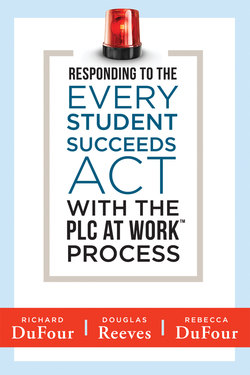Читать книгу Responding to the Every Student Succeeds Act With the PLC at Work ™ Process - Richard DuFour - Страница 8
На сайте Литреса книга снята с продажи.
Оглавление| FOREWORD |
by Jon Saphier
Communicating with utmost clarity and doing so about highly important policies is a rare combination, but it has always been a hallmark of Rick and Becky DuFour’s presentations, whether in person or in writing. In this book, Doug Reeves joins them in making a case that cries out for the attention of policymakers.
All three write with a sense of urgency, provoked by the abundance of knowledge we now have about how to use data to improve student learning and the perilous slide in the opposite direction U.S. national and state policies have induced. The PLC movement has given us the tools to study student results and turn that information into energetic reteaching and accelerated learning for those who are discouraged and those who are behind. Instead, measurement and accountability have been used as cleavers to sort and rank teachers rather than tools to analyze and improve student learning.
Teaching expertise includes skills for frequently gathering student-learning data, skillfully analyzing the data, and inventively and encouragingly reteaching content to those who didn’t get it the first time around. The PLC movement has always been about the promise and the skillful practice of these arts. Far beyond stand-up presenting, skillful teaching includes anything a person does that increases the probability of intended learning.
The belief that ability can be grown and “smart is something you can get” (Howard, 1995, page 90) has always been embedded in the DuFours’ work. That belief emerges prominently in this book. Call it growth mindset or effort-based ability; that belief provides the drive and commitment to make PLCs really work. We simply cannot allow ourselves to leave any child behind. And we can actually ensure that comes true!
The difficult work of solving complex learning problems requires teamwork and multiple minds. A solo practitioner in medicine, law, or engineering is bound to fail often. That is why they do not work alone but with deep consultation and collaboration in teams.
Deep collaboration in any field means learning how to function skillfully and nondefensively with others in teams. In education, these teams are composed of individuals who teach the same content. They use data about student performance to improve teaching and learning. Regrettably, such skill is rarely part of teacher education, but it is a vital part of professional expertise. It is up to our whole profession to make sure this skill is developed over one’s career path and to lawmakers and policymakers to ensure resources and accountability are in place to make that happen.
What the authors have laid out for us in this volume is the marriage of two skill sets that are missing in action from educators’ career development. One is analytical (the study of student data leading to error analysis and reteaching), and the other is interpersonal (how to communicate effectively and interact nondefensively in the interest of students’ learning).
Certain schools may get by without teachers who know how to use the full range of extant knowledge about and skill with PLCs and about teaching and learning if their students come from high-expectations families and affluence. These students may have the experience of having been read to since the age of two, or the experience of travel, museums, music lessons, sports teams with coaching, lively dinner conversations, family picnics, national parks, or camping. But highly developed collaborative practice is required for many of our children of poverty, and if we could generate enough of it, we wouldn’t have the intractable achievement gap we do today. That is a fact documented every single year by schools highlighted on the Education Trust’s website.
The achievement gap for children of color and of poverty is one with devastating consequences for our youngsters, our workforce, and our economy, but most of all our democracy. We used to be the land of opportunity, and our institutions (churches, clubs, and community organizations) supported that narrative. We are becoming the land of inequality with permanent residency for those trapped by poor education.
The promise of democracy is a fair chance at a good life. This book includes the prescriptions for how our education system can be the promise keeper. There’s plenty of practical advice for practitioners at all levels, like interview questions that uncover teachers’ beliefs about learning, about responsibility, and about students’ capacity to learn. But at bottom, this book is a compelling case for “ongoing, job-embedded learning of the adults” (page 2), about expertise, and about powerful use of data with deeply collaborative analysis. Policymakers take note: ongoing learning is the “key to improved learning for students” (page 2). Everything needs to be organized around that.
